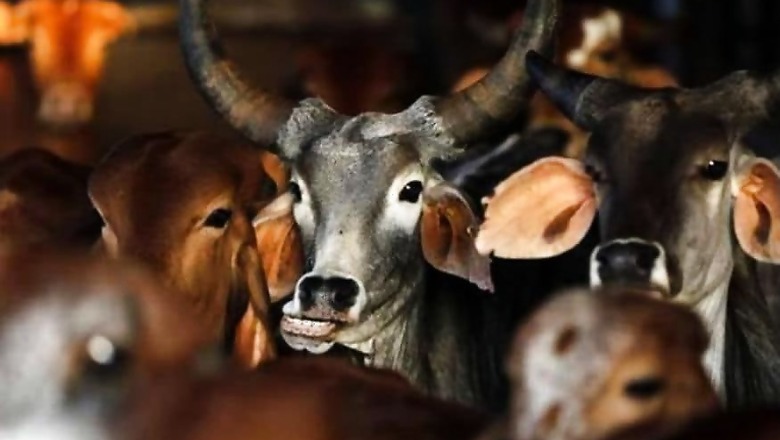
views
New Delhi: US President Donald Trump decision to withdraw the preferential trade treatment for India under generalised system of preferences (GSP) programme hinges on the Narendra Modi government’s refusal to import dairy products sourced from animals fed blood meal.
India has refused to budge citing “cultural and religious sentiments”, thus failing to meet US’s eligibility criteria for the trade agreement, under which India gets to export $5.6 billion worth of goods to US duty-free.
American dairy lobby groups insisted Indian market import dairy products sourced from animals that are fed blood meal, a protein-rich dietary supplement for cattle that utilises blood from slaughtered animals, in the US.
However, “cultural and religious sentiments” aside, scientific reasoning also stands against the use of animal products derived from cattle that has been fed blood meal.
According to Sagari Ramdas, animal breeding and genetics expert, field veterinarian and livestock researcher, blood meal poses a health risk to animals and also to humans who consume products from cattle fed a blood meal diet.
A statement by ministry of commerce said, “India has clarified that while our certification requirement, that the source animal should not have been fed animal derived blood meal, is non-negotiable given the cultural and religious sentiment, the requested simplified dairy certification procedure, without diluting this requirement, could be considered.”
“It is unfortunate that the government is invoking religious and cultural concerns, when the scientific basis of such a decision (of not using blood meal as feed for animals) is clearly situated,” Ramdas told News18.com.
According to her, the outbreak of Bovine Spongiform Encephalopathy (BSE) or the Mad Cow Disease in the 1980s occurred because the diseased cattle were fed animal tissue.
“As a result of that the World Organisation for Animal Health (OIE) and several countries, for instance Australia, have a total ban on feeding any form of ruminant feed containing animal tissue or blood meal to ruminants. And it is taken from a very pragmatic and scientific basis and also from the point of view that you do not want to compromise on consumer confidence,” Ramdas said.
Ruminant are mammals that acquire nutrients from plant-based food by fermenting it in four-chambered stomach prior to digestion. Ruminants include cattle, bovines, goats, sheep, deer and other animals.
One of the countries that did not implement this ban on ruminant feed is the US. “There is precedent, both from the OIE and other countries. So to invoke religious sentiments when you have a strong scientific reason behind it is, in my opinion, a very compromised state to be in,” Ramdas added.
According to Animal Health Australia (AHA) website, the country adopted a voluntary ban on the feeding of ruminant material to ruminants in 1996 to “minimise the risk of recycling the BSE agent if it were introduced.” The website further states that the AHA has coordinated the ruminant feed ban as part of the nation’s “commitment to retain its Transmissible Spongiform Encephalopathies (TSE) free status.”
According to Ramdas, blood meal, which consists of dried up blood from slaughtered cattle, is mostly used to enhance milk production in cattle due to its high protein content. However, negative health impacts on the animal fed a blood meal diet could also be transmitted to humans who consume products like milk from the said animal.
Indian officials, however, stand against animal product imports from the US from blood meal-fed cattle on the basis of cultural and religious sentiments. The idea of a cow, a revered animal in India, being fed a non-vegetarian diet becomes “non-negotiable” for India. The stand against blood meal is also political.
"According to article 20 (a) of the of the General Agreement on Tariffs and Trade (GATT), 1994 members can adopt or enforce measures that are necessary to protect public morals. We have presented our argument based on the provision. Additionally, it is also a call by the Centre to maintain this stand," an official from the ministry of commerce said, when asked why a scientific stand was not taken against import of blood meal-fed animal products.
While Indian officials have opted not to take a scientific stand, the National Milk Producers Federation and the US Dairy Export Council, two American lobby groups, went on record last year to say that India has “maintained unscientific dairy certificate requirements for dairy imports” and has “refused extensive good-faith efforts to restore trade in dairy products between the US and India”.
Ramdas said that thus a scientific resistance to blood meal-fed animal products has far more basis. She also mentioned that a ruminant feed like blood meal or animal tissue diet is not the natural preference of ruminants.
“The natural preference of a ruminant is to graze on a plant based diet. So feeding a ruminant an animal tissue is not physiologically and anatomically a natural fit, unlike a carnivore,” Ramdas said. “Animals are very picky about what they eat.”




















Comments
0 comment